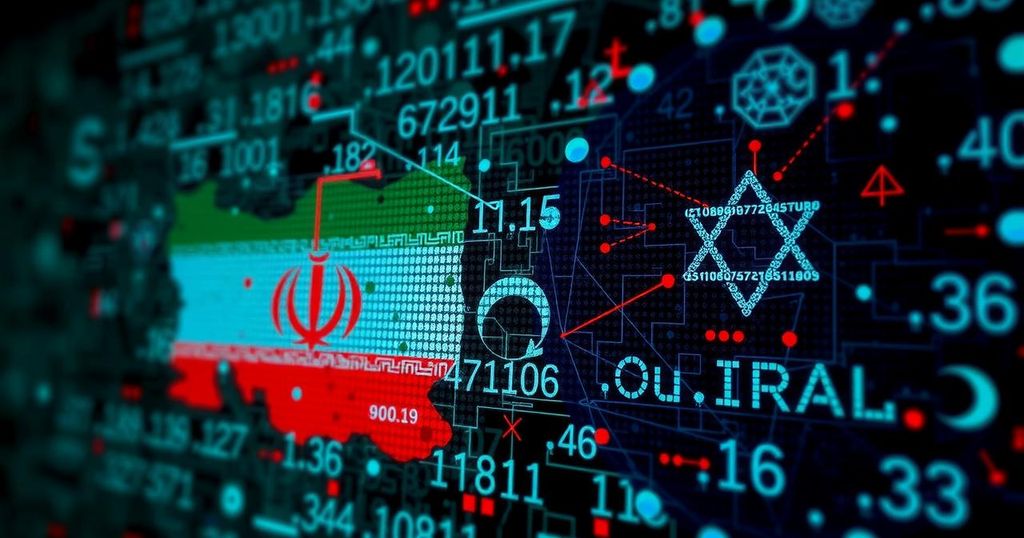Iran’s Cyber Operations Target Israel Intensify in Aftermath of Gaza Conflict
Following the onset of the Gaza war in October 2023, Iran has significantly increased its cyberattacks against Israel, shifting its focus from previous targets such as the United States. Nearly half of the cyber operations by Iran now target Israeli companies, according to Microsoft’s Digital Defense Report. Social media campaigns have also been launched to destabilize Israel, coinciding with the outbreak of conflict, as evidenced by various accounts created to mislead the public regarding political leadership and hostages.
In the wake of the Gaza conflict that began in October 2023, Iran has dramatically increased its cyberattack operations aimed at Israel, marking a shift from its previous focus on the United States. According to the Microsoft Digital Defense Report, nearly half of the Iranian cyber operations observed between October 2023 and July 2024 were directed against Israeli companies. This represents a significant escalation compared to the period before the outbreak of hostilities, during which only 10 percent of Iranian cyberattacks were aimed at Israel, while 35 percent targeted American entities and 20 percent were directed at the United Arab Emirates. Microsoft highlighted that the Iranian regime has actively engaged in numerous social media campaigns designed to destabilize Israel following the onset of the Israel-Hamas war. Notably, within just two days of Hamas’s attack on October 7, 2023, Iran launched several new influence operations. One such operation included an account named “Tears of War,” which impersonated Israeli activists critical of Prime Minister Benjamin Netanyahu’s leadership amid the hostage crisis stemming from the conflict. Additionally, an account labeled “KarMa,” allegedly created by an Iranian intelligence unit, falsely claimed to represent Israeli citizens advocating for Netanyahu’s resignation. The Iranian intelligence services also employed tactics of impersonation, creating a Telegram account featuring the logo of Hamas’s military wing to disseminate false information regarding hostages in Gaza while issuing threats against Israelis. The report does not clarify whether these actions were conducted with the cooperation or consent of Hamas. Moreover, the report indicates that Iranian entities expanded their cyber-enabled influence campaigns beyond Israel, intent on eroding international support—political, military, and economic—toward Israel in light of its military offensives. The conflict has resulted in substantial casualties, with significant loss of civilian life reported on both sides. The death toll from the Hamas attack constitutes a stark figure of 1,206 individuals, predominantly civilians, according to official Israeli data. In retaliation, Israel’s military strategy in Gaza has reportedly resulted in the deaths of approximately 42,289 individuals, largely civilians, as stated by the health ministry of Hamas-controlled Gaza, this tally being deemed credible by United Nations assessments.
The escalation of cyberattacks by Iran against Israel represents a significant development in the regional security landscape following the commencement of the Gaza conflict in late 2023. Historically, Iranian cyber operations have primarily targeted the United States, but the onset of hostilities with Israel prompted a strategic redirection of focus towards Israeli entities. This realignment underscores the importance of cyber warfare as a tool in contemporary conflicts, particularly in the context of interstate relations marked by hostility and territorial disputes. The report by Microsoft not only sheds light on the operational tactics employed by Iranian cyber groups but also highlights the broader implications of these operations on international diplomatic and military alliances.
In summary, Iran’s surge in cyberattacks against Israel post-Gaza war signifies a pivotal shift in its strategic operations, moving away from previous targets such as the United States. The Microsoft Digital Defense Report provides a detailed analysis of the increased intensity and scope of Iranian cyber activities, which have evolved to include extensive social media campaigns and influence operations aimed at destabilizing Israel and disrupting its international support system. The high casualty tolls reported from the conflict further complicate the geopolitical landscape and underscore the destructive nature of cyber warfare in modern confrontations.
Original Source: www.voanews.com




Post Comment